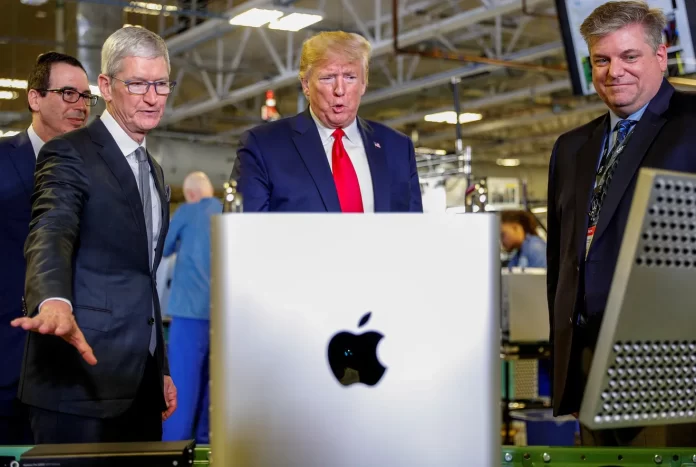Apple shares dropped up to 3% on Friday — wiping out nearly $100 billion in market value — after Donald Trump threatened the tech giant with a 25% tariff on iPhones not made in the United States. The former president took to his Truth Social platform to air his latest grievance with American corporations doing business overseas.
“I expect their iPhone’s that will be sold in the United States of America will be manufactured and built in the United States, not India, or anyplace else,” Trump wrote. “If that is not the case, a Tariff of at least 25% must be paid by Apple to the U.S.”
Apple declined to comment on the statement, which comes less than a day after reports that the company was finalizing a $1.5 billion iPhone component production facility in India.
A Billion-Dollar Swipe at Apple and the Broader Market
Trump’s comments shook investors and triggered a broader market dip. The S&P 500 opened 1% lower following his dual threats — one aimed at Apple, the other directed at the European Union, where he warned of 50% tariffs amid stalled trade talks.
This isn’t the first time Trump has taken direct aim at individual U.S. companies. Walmart, Amazon, and Mattel have all been publicly criticized by the former president over pricing strategies and overseas manufacturing, breaking the traditional presidential norm of not targeting private business operations so explicitly.
His rebuke of Apple, however, may carry more weight — especially given Apple’s plans to relocate its iPhone production to India by 2026. About half of all iPhones are currently made in China.
“I Treated You Very Good”: Trump’s Friction with Tim Cook
Trump has previously boasted about his relationship with Apple CEO Tim Cook, but that friendship appears to be under strain.
“I had a little problem with Tim Cook yesterday,” Trump told reporters last week. “I said to him, ‘My friend, I treated you very good. You’re coming here with $500 billion, but now I hear you’re building all over India.’ I don’t want you building in India.”
Treasury Secretary Scott Bessent backed up Trump’s criticism in a Fox News appearance, calling on Apple to help bring precision manufacturing — especially semiconductor production — back to the U.S. He also took a swipe at Cook for skipping a recent presidential trip to Saudi Arabia.
Big Talk, Bigger Costs: Could iPhones Made in the USA Hit $3,500?
Apple’s high-end iPhones currently sell for about $1,199. But if the company were forced to relocate its entire production to the U.S., the cost to consumers could skyrocket. Analysts estimate that a fully American-made iPhone could cost between $1,500 and $3,500 depending on how much of the supply chain can be reshored.
Wedbush Securities analyst Dan Ives called the idea a “fairy tale” in a Friday note to clients. “The supply chain economics and scale needed to make that happen simply don’t exist in the U.S.,” Ives wrote. “We expect Apple to pursue a negotiation route with the administration.”
More Than Just Apple: Trump’s Business Targets Expand
Apple is just the latest company in Trump’s crosshairs. He recently warned Walmart to “EAT THE TARIFFS” after the company signaled rising costs. The Wall Street Journal’s editorial board criticized Trump’s corporate interventions as a “Marxist” overreach, likening them to his campaign rival Kamala Harris’s policies.
Target and other retailers have since walked a tightrope on pricing. Target said raising costs would be a “very last resort.” Mattel, which was threatened with a 100% tariff on toys, admitted it couldn’t feasibly move production to the U.S. Amazon, after backlash over showing tariff-related fees at checkout, reversed course entirely.
Trump’s Trade War, Round Two
Trump’s second-term approach to trade appears to involve more direct pressure on corporate America, particularly those not aligned with his nationalist manufacturing vision. From phone makers to toy manufacturers, Trump is using the tariff as both carrot and stick.
While it plays well with parts of his base, analysts warn it could drive up costs for U.S. consumers and threaten the market’s fragile recovery. For Apple, the road ahead may include more meetings, more negotiations — and potentially, more tariffs.








